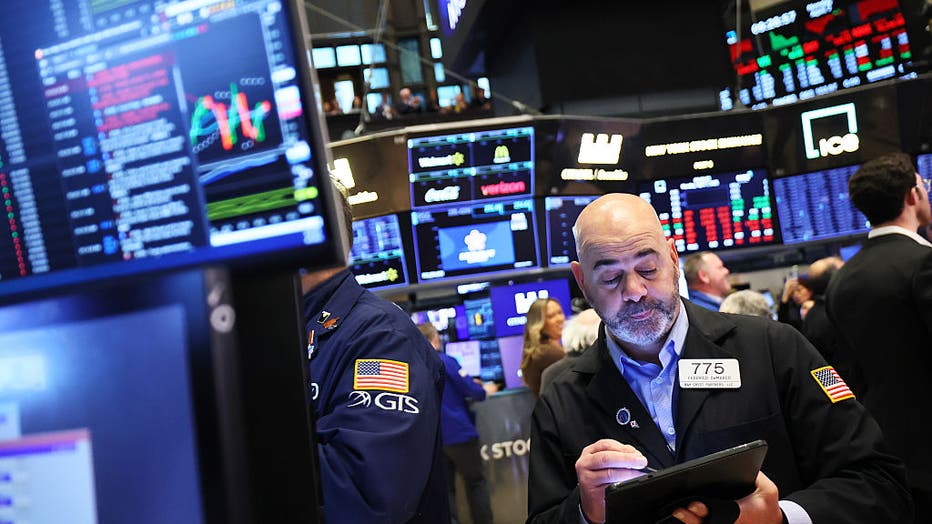Stocks soar as Trump announces 90-day tariff pause—China excluded; Dow jumps 2,000 points
Stocks surge as Trump announces tariff pause
President Trump announced an increase in tariffs for Chinese imports, while also announcing a 90 day pause which caused markets to surge on Wednesday afternoon.
NEW YORK - U.S. stocks are surging on a euphoric Wall Street Wednesday after President Donald Trump said he would temporarily back off on some of his tariffs, as investors had desperately hoped he would.
Why you should care:
The S&P 500 was up 7.8% in afternoon trading. It had been down earlier in the morning amid worries about Trump's trade war and whether it would cause a recession as economists fear. But it spiked immediately after Trump sent the social-media posting that investors have been waiting for.
The Dow Jones Industrial Average was up 2,476 points, or 6.6%, as of 1:35 p.m. Eastern time, and the Nasdaq composite was 9% higher.
Democratic Senators respond to 90-day tariff pause
Democratic Senators held a press conference to respond to President Donald Trump's announced a 90-day pause on some tariffs. In a recent post on Truth Social, Trump announced the pause, and said the United States would raise the tariffs on China to 125%.
Investors have been desperate for Trump to ease up on his tariffs, which economists say could cause a global recession and increase inflation.
RELATED: Tariffs live updates: Trump hikes China tariffs further, pauses all others
But Trump also said that he’s raising tariffs on China, the world’s second-largest economy.
What they're saying:
"Based on the lack of respect that China has shown to the World’s Markets, I am hereby raising the Tariff charged to China by the United States of America to 125%, effective immediately," Trump posted on social media. "The days of ripping off the U.S.A., and other Countries, is no longer sustainable or acceptable."
Trump added that 75 other countries are now negotiating tariffs and has "authorized a 90 day PAUSE, and a substantially lowered Reciprocal Tariff during this period, of 10%, also effective immediately. Thank you for your attention to this matter!"
RELATED: Trump: Tariffs on imported pharmaceuticals coming ‘shortly’
When asked why did he pause the tariffs, Trump responded "I thought that people were jumping a bit out of line. They were getting yippee, a little bit afraid."
"Last year, China made, $1 trillion off trade with the United States," Trump later told reporters. "That's not right. And now I've reversed it, and it's for short period of time."
"People investing in our country, they're going to do better than they've ever done before," he added.
Trump authorizes 90-day pause on tariffs
White House Press Secretary Karoline Leavitt and Treasury Secretary confirm 90-day tariff pause. The two addressing the media outside the White House saying that President is implementing the pause for most of its trading but that does not include China.
The backstory:
Huge swings have become routine for financial markets worldwide recently, not just day to day but hour to hour, as investors struggle to game out what Trump's trade war will do to the economy.

Traders work on the floor of the New York Stock Exchange during morning trading on April 07, 2025 in New York City. (Photo by Michael M. Santiago/Getty Images)
Trump previously imposed a 104% tariff on China
Wall Street’s latest moves came after Trump’s latest round of tariffs kicked in after midnight for imports from around the world. That included a 104% tax on things coming from China, and the world’s second-largest economy quickly retaliated by saying it would raise tariffs on U.S. goods to 84% on Thursday.
China responds after new US tariffs take effect
President Trump's reciprocal tariffs on several countries are now in effect, that includes a massive 104% tariff on China.
"If the U.S. insists on further escalating its economic and trade restrictions, China has the firm will and abundant means to take necessary countermeasures and fight to the end" the Ministry of Commerce said.
RELATED: Delta pulls 2025 forecast, says growth has stalled in Trump's trade war
Investors worry about tariffs
Investors notoriously hate dealing with uncertainty about the economy, and "there are so many moving parts at the moment, it’s hard to keep track," said JJ Kinahan, chief executive officer of Tastytrade from IG.
Some of Wednesday’s strongest action was in the U.S. bond market, where Treasury yields rose sharply again. The yield on the 10-year Treasury climbed to 4.44% from 4.26% late Tuesday and from just 4.01% at the end of last week. It approached 4.50% earlier in the morning. That’s a huge move for the bond market and could be an indication of stress.
The Source: The Associated Press contributed to this report. The information in this story comes from a variety of sources, including President Donald Trump's social media posts, statements from China’s Ministry of Commerce, and comments from financial experts like JJ Kinahan. This story was reported from Los Angeles.

